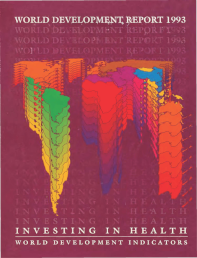 The International Bank for Reconstruction and Development World Bank Oxford University Press, 1993 348 pp., Paperback EUR 6,68€ ISBN: 0-19-620890-0 Available here The World Development Report (WDR) is a report presented by the World Bank. The World Bank is an international financial institution that provides loans to governments of developing countries, and that started focusing early on people’s basic needs and global public health. This edition of the WDR addresses the relation between health and economy and the issues around how investing in health in developing countries should be done. Starting with an analysis of the global health situation, the WDR recognizes that although there are substantial improvements in health in the last decades, there are still considerable public health problems that constitute a heavy burden for households, slowing the overall economic development. It considers that the magnitude of these problems is due to internal issues in health systems. First, there is an excessive use of public funds for tertiary rather than primary services. Second, there is an iniquity in distribution of resources - the poorest have a higher burden of disease and worse access to health services. Third, the inefficiency of health services is high and is due to the lack of adequate information systems, lack of planning capacity and inefficient use of overall resources. Fourth, there has been an increase in health costs in recent years, partly due to the increase in professionals and technological innovation and lack of regulation of the health market. The Report's authors argue that governments should play a central role in the regulation of the health market as health is a common good and the private sector cannot be expected to produce this good. Since the main issue with health in developing countries lies with the availability of a bigger budget, the WDR stresses the usefulness of a cost-effectiveness analysis in planning health services, suggesting several strategies. First, public spending and economic policies should prioritize the poorest and favour equity. Also, health expenditures should be concentrated on cost-effective interventions, redirected from specialized care to primary and preventive services (such as immunization programs, HIV prevention and pre-natal and maternal care), improving efficiency. Non-cost-effective interventions must be reduced (for example, cardiac surgery, premature advanced care or AIDS medication) in order to liberate investment for cost-effective interventions. Governments should increase the training of health professionals, particularly midwives and nurses, as well as postgraduate training in public health, planning and administration – since less cost-effective interventions should be reduced, there’s no need for an investment in too many specialists. Three other measures could be taken: decentralization, reinforcement of information systems and research. Despite the controversy, linked to short-term negative impact of these programs, the WDR argues for a long-term positive impact on public health, as long as no cuts are made to essential social services. For this, the WDR argues that external aid should be better coordinated and that recipient governments should be better able to make choices for the use of aid funds. The Report tackles issues still relevant to the health sector all around the globe, but more prominent in developing countries. It was also an innovative report: it popularized the use of DALY as a methodology to assess the cost-effectiveness of health interventions, and it already tackled the problem of a global crisis of antibiotic resistance. However, at the same time, it was controversial on many points. First, it encouraged the use of the private sector as a provider of services, despite the evidence that such methods decrease the uptake of services. Second, it creates a climate where high levels of lending are deemed to be good. Third, it raises some concerns on the capability of developing countries adapting and adopting these approaches and on how indigenous populations are disregarded in some analysis. Fourth and biggest controversy is on the lack of evidence for some of the health policies that are suggested, since it was written before systematic reviews. But despite the criticism that may be made on the 1993 WDR, it doesn’t take away the importance of this document and its role in tackling the idea that investing in health should be, overall, planned and cost-effective. Autoria Teresa Garcia Edição Joana Silva Referências bibliográficas 1. Abbasi K. The World Bank on world health: under fire. BMJ. 1999;318(7189):1003-1006. 2. Mawdsley E., Rigg J. The World Development Report II: continuity and change in development orthodoxies. Sage Journals. 2003 Out;3(4):271-286
1 Comentário
|
Contactos
|
Email
newsletter.cmisp@gmail.com |
Twitter
twitter.com/saudemaispubli1 |
Instagram
instagram.com/saudemaispublica |
